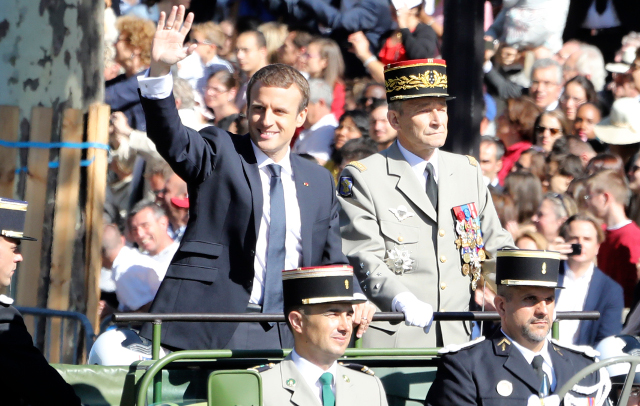Macron has shown he is not afraid to enter into battle but he probably wasn't expecting that within a couple of months of him becoming head of state he would be at war with his own armed forces chief.
The conflict began last week when France’s budget minister Gerald Darmanin revealed details of how the French government will make spending cuts in order to get the country’s finances under control.
No ministry would be spared, not even the ministry of defence which would have to cope with making savings of €850 million, mainly on the cost of equipment.
The following day on July 12th, the furious chief of the French armed forces General Pierre de Villiers protested the cuts before the president’s council of defence and the parliament’s own defence commission.
The irate De Villiers, known for talking frankly, apparently used the phrase “I won’t let you fuck me like that” (Je ne me laisserai pas baiser comme ça).
While MPs may have applauded his stance, President Macron was clearly irked.
On the evening of July 13th, with US President Donald Trump in town, Macron paid a visit to the Ministry of Defence for the traditional homage to soldiers before the July 14th military parade.
“It is not dignified to hold certain debates in the public arena,” Macron told those present with de Villiers clearly in mind.
Then in an authoritarian tone he told the military chiefs assembled at the ministry: “I am your boss”.
Telling them he will stick to his commitments to make cuts he said: “I don’t need pressure or commentary”.
At that point it looked like the general wouldn’t even accompany Macron for the traditional July 14th parade along the Champs-Elysées.
But in the end he took up his place alongside the president in their military vehicle, albeit with a face of thunder.

Two days later on July 16th the president rammed his message home.
In an interview with Journal du Dimanche Macron said: “If the [Armed Forces] chief of staff has an issue with the President of the Republique, then it is the chief of defence staff who will change his position.”
But De Villiers may jump first. He suggested in a Facebook post this week that he will make a decision this week.
If he were to resign in protest it would be an unprecedented move and provoke a major crisis for the French president.
But even if he were to stay it appears that Macron is heading for troubled waters, given that France's armed forces are involved in military operations in Mali, Iraq and Syria.

“Armies basically obey. So in substance the president was within his rights to restate his authority,” a former chief of the French armed forces Henri Bentégeat told Le Monde newspaper.
“But the way he did it will leave marks. You cannot publicly question a military leader like that in front of his subordinates,” said Bentégeat, who said that the head of the armed forces was “just doing his duty” by defending the budget for the military.
“When Macron attends the first ceremony for a soldier killed because of a lack of equipment, all the criticism will be directed at him,” said Bentégeant.



 Please whitelist us to continue reading.
Please whitelist us to continue reading.